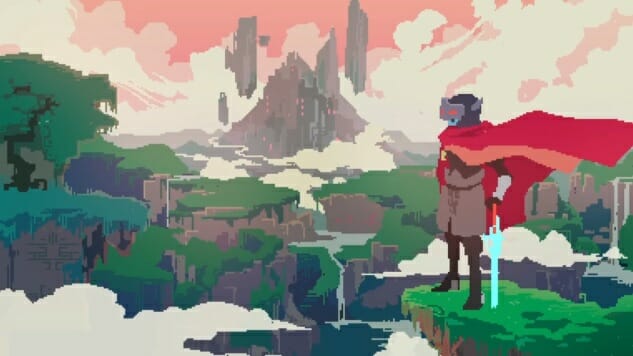Hyper Light Drifter: A Little Bit of Souls

Hyper Light Drifter assaults the senses with bright strikes of purple, blue and pink set to thumping tones riddled with electronic crackling. It’s an elegant game with a comprehensive tone. Nothing feels out of place as you gently guide your sword and gun wielding protagonist through a world overrun by biology and technology succumbing to full decay. You tap a button to swing a sword, pull a trigger to fire your gun, and constantly monitor your field of vision to know when to slam the dodge button so that it might save your life.
This is the story of playing Hyper Light Drifter: you traverse an unfamiliar world with familiar controls while being bludgeoned by sights and sounds that cascade toward you without pause. You fight for your life. You will die many times.
The game almost demands that you draw comparisons between it and another game that extracts infinite death and infinite effort from the player. From Software’s Souls series (and its goodtime buddy Bloodborne) has built its reputation on both its difficulty and its oblique, indirect worldbuilding. The fan community around that game has collectively spent an impossible-seeming amount of time figuring out what the hell is actually happening in those games, and all it takes is a mention of their lore on social media to start a firestorm of speculation and disagreement. From an outsider’s perspective, it is almost religious, with various interpretations surfacing and submerging as if enlightened disciples could get us somehow closer to the depths of truth.

Hyper Light Drifter clings close to the Souls model of delivering this world. As far as I could tell during my seven-hour playthrough, there is no text in the game to ever explain anything to you. Characters speak in pictograms that show what happened, and the moments in-between those pictograms are left up to the imagination of the player. Nothing is explicit, and most of the game’s story is told through an understanding that this world has somehow gone wrong, although it is unclear what the mechanism of that going wrong might been to the player who is unwilling to delve through the translation of hieroglyphics and Reddit theorycrafting posts.
This isn’t a weakness, and I find Drifter’s gestural, evocative work to be profoundly more engaging than the “build it from the scraps” model of the Souls series. Those games provide a deluge of details in the form of item descriptions, scraps of dialogue, and environmental cues that an industrious adherent can weave together into a coherent form, and while I am certain that Drifter allows for the same thing, it does seem profoundly unnecessary. In the tradition of Stephen King’s Dark Tower series or Gene Wolfe’s Book of the New Sun, Hyper Light Drifter seems like it would get less interesting the more certainty you have about it.
The world of Hyper Light Drifter is a rotting corpse, and the lizard people or bear people or bird people of that world continue to dwell in the ruins of some kind of technologically advanced civilization. You, embodying the player character, are haunted by your own death, and you’re haunted by some kind of force that keeps this world in its state of decay. It is unclear whether progress in the game means finally killing the world or setting it free, and that ambivalence sticks with me even now.